Asbestos Testing Service
These days, everyone knows that asbestos is a major health hazard that’s capable of causing severe diseases like mesothelioma and lung cancer. Unfortunately, not everyone can be as sure that their home is asbestos-free.
Since even short-term exposure to asbestos can cause permanent damage to your health, asbestos testing is not just important, it’s also necessary.
In 2016, the Canadian government announced that it will be banning all asbestos and asbestos-containing products by 2018. Finally, this ban took in effect as of 30th of December, 2018, with exemptions.
If you’re worried about asbestos in your home or place of work, call Mold Busters today and book an asbestos test. We also provide complete asbestos testing services and asbestos abatement in Montreal.
*Please remember to shut down all heating, cooling and HVAC systems during an asbestos test to prevent asbestos fibres from spreading and to minimize chances of asbestos exposure.
Common Asbestos-Containing Materials (ACMs)
The following is a description of the most common asbestos-containing materials found in residential properties, intended to help homeowners recognize potential hazards in their home.
Asbestos testing for popcorn ceilings
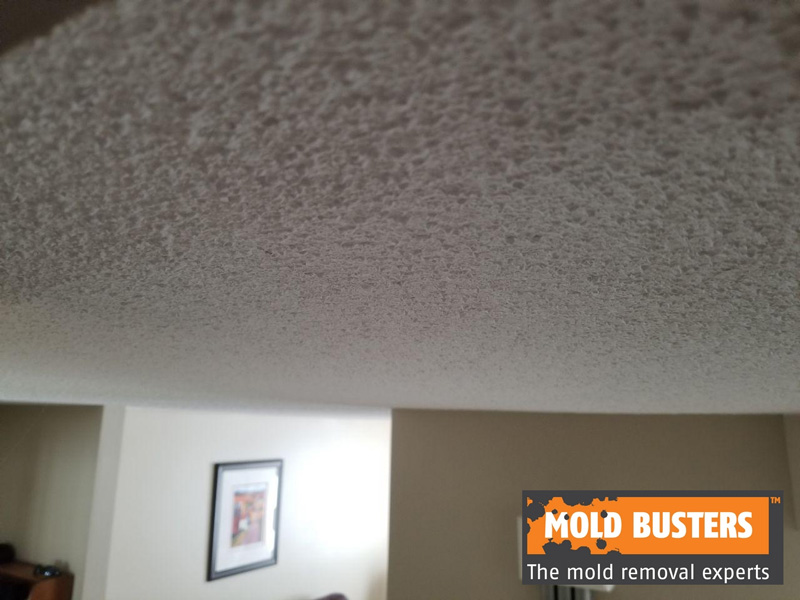
A popcorn ceiling, also known as a stippled ceiling, was a popular textured finish in many residential and commercial properties built before the 1990s.
While stippled ceilings can be made of various materials including Styrofoam and cardboard, many of them contain hazardous materials like lead paint and asbestos-contaminated vermiculite.
Although popcorn ceilings are now considered outdated and undesirable, they are still present in many older homes.
If you are worried about asbestos in your stipple ceiling, contact Mold Busters for a professional asbestos test. We will inspect your ceiling, collect a sample and send it to a third-party accredited laboratory for instant analysis.
NOTE: Do not proceed with any popcorn ceiling removal project before first performing an asbestos test to confirm or deny the presence of asbestos. Neglecting to do so may expose you to hazardous asbestos and put your health at risk.
MORE INFO: For more information read our resource page about asbestos in popcorn ceilings.
Asbestos testing for 9″x9″ tiles
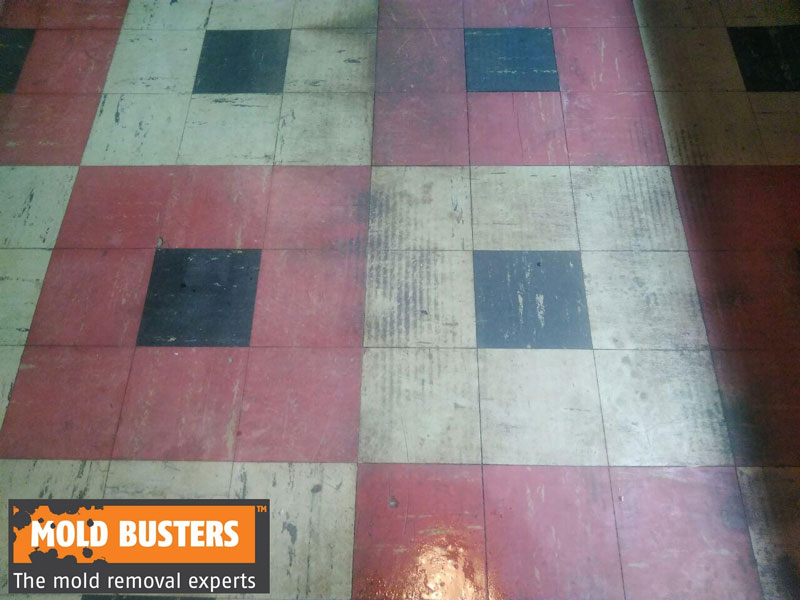
While identifying any asbestos-containing material is best done with an asbestos test, certain products are more likely to contain asbestos than others. Floor tiles are a good example of this.
By looking at the size, colour, pattern, model number, date of manufacture and/or date of installation of your floor tiles, you can already get a good idea of whether or not they contain asbestos.
We now know that the most popular size of asbestos-containing tiles was 9”x9”, but it is not uncommon to find asbestos in 12”x12” tiles as well as 18”x18” tiles.
MORE INFO: For more information read our resource page about asbestos in tiles.
What to do if your tiles contain asbestos?
Generally, you have three options should you discover asbestos tiles in your home:
- Leave the tiles in place: This is recommended only if the tiles are in good condition (they are not damaged or disturbed in any way that allows asbestos fibres to become airborne)
- Cover up the tiles: Again, you should do this only if the tiles are in good shape.
- Remove the asbestos tiles: This should be done in a safe, contained environment, preferably by a professional asbestos removal company.
Asbestos testing for vermiculite insulation
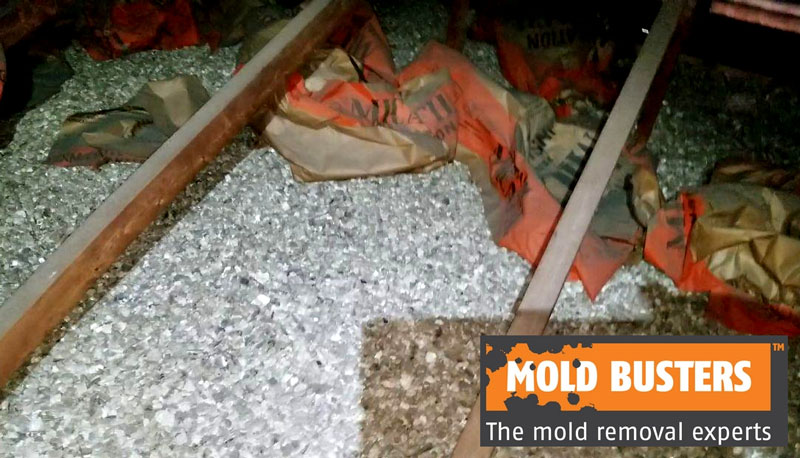
Vermiculite insulation, which was a popular material used to insulate attics before the 1990s, is now often found to be contaminated with asbestos. The biggest concern when it comes to asbestos-contaminated vermiculite is loose-fill or blow-in attic insulation.
If you have an older home with this type of insulation in the attic, it is worthwhile to get it tested for asbestos. The asbestos test is quick and will give you an accurate answer to your worries. Learn more about vermiculite attic insulation here.
Asbestos testing for pipe wrap and duct wrap
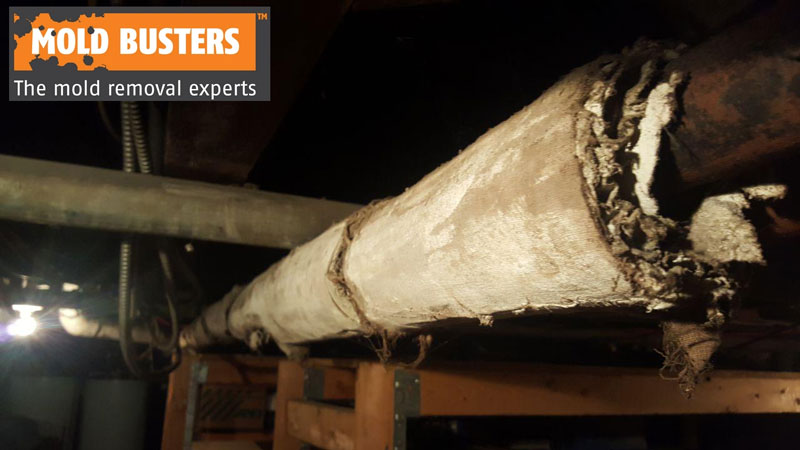
We often find asbestos wrap around duct work and plumbing, which is oftentimes hidden behind walls so homeowners have no idea it’s there. What’s more, pipe and duct wrap sometimes gets damaged during renovations or regular maintenance work (such as duct cleaning), releasing hazardous asbestos fibres into the air, often without the knowledge of the building occupants. For this reason, owners of older properties should get their duct wrap tested for asbestos if there is any reason to suspect asbestos contamination.
It is essential to identify any potential asbestos-containing materials (ACMs) and have them tested for asbestos before the start of any mold removal or renovation projects, otherwise you put your health at an extreme risk. Contact Mold Busters for fast, safe and accurate asbestos testing services in Ontario and Quebec.
Asbestos testing for insulating wrap around heat registers
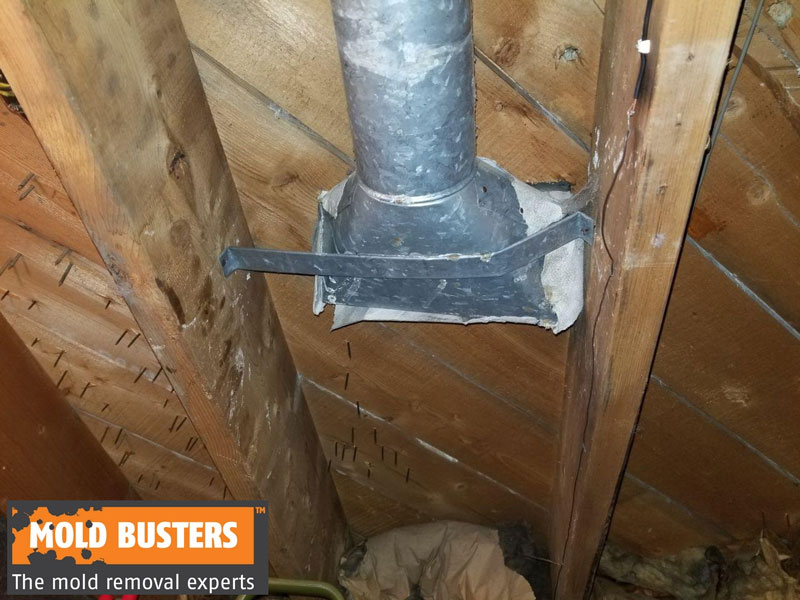
Similar to duct wrap in appearance and function, heat register insulation was the norm in many homes back in the day. However, many types of insulating wrap contain asbestos. And because heat register wrap is friable, often draping over air vents, it is also one of the most concerning potential ACMs in the home. If the wrap contains asbestos, this means that the air being expelled from the vent can dislodge hazardous asbestos fibres directly into the air!
Unfortunately, heat registers wrap is often overlooked in home inspections, which makes it crucial for the homeowners to take the matter into their own hands and contact a professional for an asbestos test.
Types of asbestos
Asbestos can be classified into six main types:
- Chrysotile
- Amosite
- Crocidolite
- Tremorite
- Anthophyllite
- Actinolite
However, of all these types, Chrysotile (also known as “white asbestos”) is the most widely used, accounting for more than 95% of worldwide asbestos use.
MORE INFO: To read more about the different types of asbestos and Canada’s regulations surrounding its use, visit the About Asbestos page.
Why it’s important to test for asbestos?
At Mold Busters, it is our professional opinion that it is better to be safe than sorry. That’s why we recommend that every building be tested for asbestos, especially those built over 10 years ago (when asbestos was still a common material in construction).
Asbestos, a naturally occurring mineral, was used extensively between 1920 and 1989 to insulate and fireproof buildings. Later, it was discovered that exposure to asbestos was associated with serious health problems like chronic wheezing, coughing, breathing difficulties, mesothelioma and even lung cancer.
As such, it is crucial that Canadian homeowners continue to increase awareness about and push for professional asbestos testing in Ottawa and Montreal.
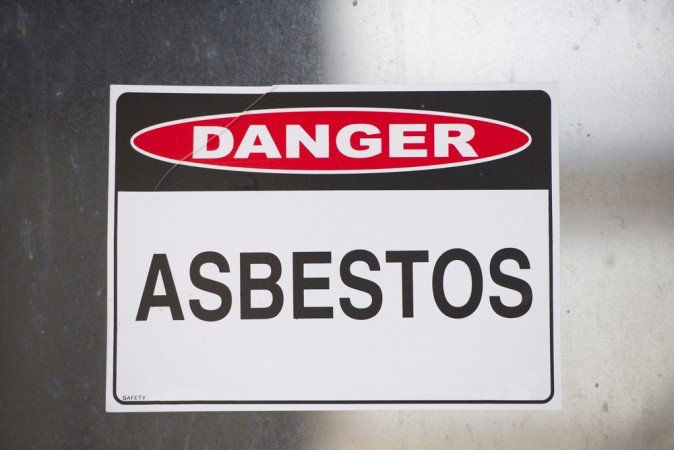
New Asbestos Regulations in Quebec
The Commission de la santé et de la sécurité au travail (CSST), which is responsible for administering occupational health and safety systems in Quebec, recently introduced new provisions regarding safe asbestos management.
According to the updated regulations, employers must check any and all buildings under their authority for asbestos. They must also keep an updated register containing all details relevant to the asbestos inspections, including the date that the inspections were carried out; the location of flocking and heat-insulating materials that were inspected; and the presence and type of asbestos detected (or the absence of asbestos). This register must be made available to all employees who work in the building.
The new provisions also outline how often inspections should be carried out and the required corrective measures that need to be implemented should asbestos be identified. See full safe asbestos management provisions.
For over 19 years, Mold Busters has been providing fast and reliable asbestos testing services for clients in all parts of Quebec. Our asbestos tests come with complete written reports and our experts are always available to answer any of your questions. Contact Canada’s trusted indoor air quality experts today.
How asbestos affects your health?
Asbestos particles are tiny and fibrous. If disturbed or released into the air, they can be inhaled and cause serious problems like chronic wheezing, coughing or difficulty breathing, callus-like growths in the throat and lungs, mesothelioma, and eventually lung cancer.
Asbestos fibres can be released through a variety of routine maintenance procedures and renovation work, such as drilling into or demolishing drywall, installing electrical wiring, removing floor or ceiling tiles, replacing concrete water tanks and working with thermal insulation.
It is also important when conducting asbestos abatement to work in a contained area, wearing respirator masks and full body suits, in order to prevent asbestos exposure.
Not implementing proper asbestos testing and removal procedures puts you at risk. Only professionals have the knowledge and ability to safely perform asbestos identification, asbestos abatement and proper disposal.
For the fastest, most reliable asbestos testing in Ottawa or asbestos testing in Montreal, contact Mold Busters. We follow EPA safety standards for asbestos testing.
How much does asbestos testing cost?
The costs of asbestos testing procedure can vary and depend of various factors.
The first step is to have a professional gather a sample of the material you suspect is contaminated. It’s impossible to identify asbestos just by looking at it.
The sample is then sent to an accredited third-party laboratory, where it’s analyzed using polarized light microscopy (PLM). If the material is found to be asbestos, then asbestos removal will be necessary.
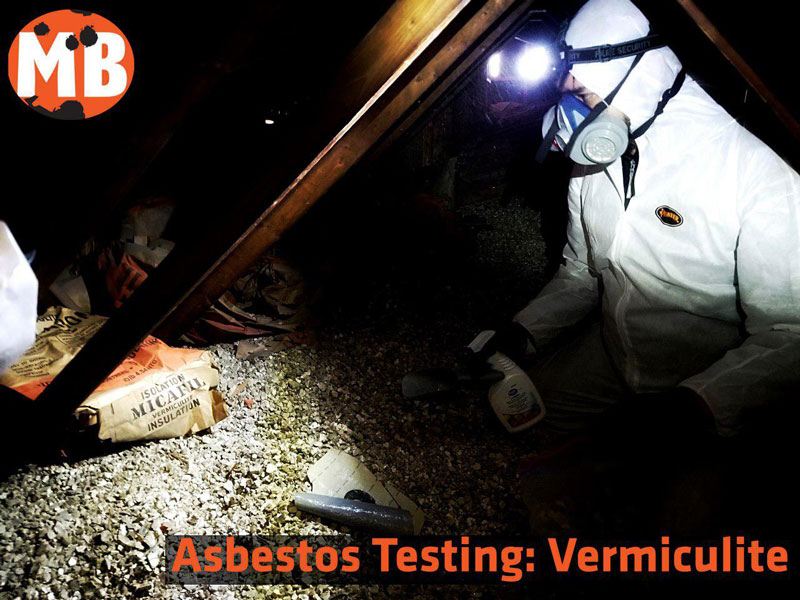
Are asbestos testing kits reliable?
While you can purchase do-it-yourself asbestos testing kits, it is much more advisable to seek professional, otherwise you increase your chances of inadvertently releasing asbestos fibres into the air and exposing yourself to hazardous asbestos.
Asbestos testing professionals are certified and have a deep knowledge of safe asbestos testing and removal processes as well as of proper asbestos disposal techniques.
Advantages of hiring a professional for asbestos testing
As with any other profession, it takes education and experience to provide clients with great service, and the inspection and remediation industry is no different.
Certification and experience
In addition to holding various levels of certification, professional asbestos inspectors will have dealt with hundreds of situations like yours and will therefore be able to offer valuable insight based on years of real-world experience. They may even point out other, less obvious, materials in your home that could be a threat including insulation floor tiles and roofing materials (e.g. shingles).
Utmost safety
Trained professionals prioritize safety throughout the entire inspection process. From wearing personal protective gear to setting up proper containment of the affected area, they know what measures must be taken to ensure that asbestos fibres do not become airborne and compromise your safety.
Accuracy and speed
To ensure the utmost accuracy, Mold Busters inspectors always take several samples of a suspect material when testing for asbestos. This extra step reduces the margin of error as well as the chances of inadequate specimens.
The samples are then sent to a third-party laboratory for analysis, and you get the results delivered to you in a complete report within 3-4 business days.
Customer service
When you have a human inspector rather than a DIY testing kit on your side, you also have a valuable resource you can reach out to any time with your questions and concerns. You also have peace of mind knowing that your asbestos test was conducted according to established procedures and analyzed by a reputable laboratory.
Based on the arguments outlined above, it’s safe to say that professional asbestos testing is far more encompassing, accurate and safe than any DIY asbestos test.
Just be sure to make the right choice when looking for a professional asbestos inspector—choose one with strong credentials like IICRC certification, extensive experience and a good reputation. Choose Mold Busters!
Mold Busters now provides PALA-certified asbestos testing in Quebec
Mold Busters proudly offers asbestos testing services in Quebec that meet the criteria set forth by the Laboratory Accreditation Program (PALA), which is administered by the Centre of Expertise in Environmental Analysis of Quebec (CEAEQ). This is part of our guarantee to always look out for and provide excellent service to our customers.